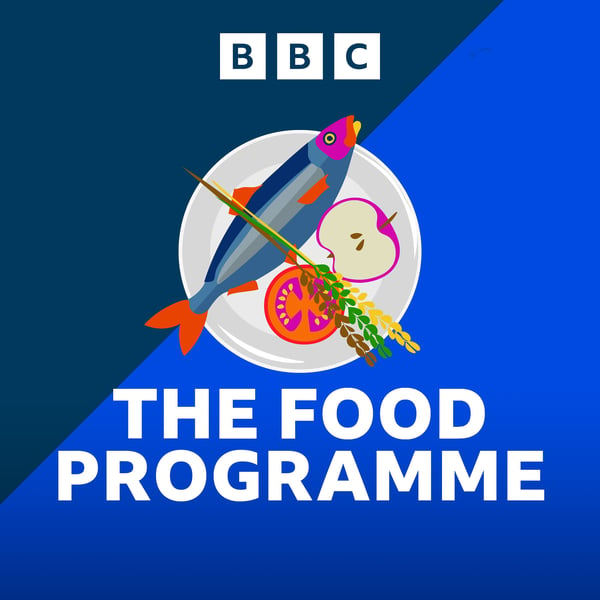Once Upon a Mealtime
The Food Programme
BBC
4.4 • 943 Ratings
🗓️ 22 November 2024
⏱️ 43 minutes
🧾️ Download transcript
Summary
Whether it's Turkish Delight, chocolate cake or ginger beer - some of our earliest food memories are shaped by the books we read. In this episode Sheila Dillon goes down the rabbit-hole of children's fiction to discover why young readers find descriptions of food so compelling.
She hears from bestselling children's author Katherine Rundell who insists on eating the food she features in her books. Katherine reveals what it's like to sample a tarantula in the name of fiction. Professor of Children's Literature Michael Rosen unpicks the themes of greed, temptation and fear that surface in both his work and that of Roald Dahl. At the Bath Children's Literature Festival Supertato author Sue Hendra and the illustrator Rob Biddulph talk about how children are drawn to the everydayness of food.
The programme concludes in the Children's Bookshop in North London as the Food Programme presenters gather to discuss their favourite food books of the year for both younger and older readers. They are assisted by the bookshop owner Sanchita Basu de Sarkar and the author of The Chronicles of Wetherwhy Anna James.
Presented by Sheila Dillon Produced for BBC Audio in Bristol by Robin Markwell
This episode features extracts from The Lion, The Witch and The Wardrobe by CS Lewis read by Katherine Rundell, The Boy Next Door by Enid Blyton read by Miriam Margolyes (for BBC Radio 4 in 2008) and The Twits by Roald Dahl read by Kathy Burke (for Jackanory, BBC TV in 1995)
Transcript
Click on a timestamp to play from that location
| 0:00.0 | You are about to listen to a BBC podcast and I'd like to tell you a bit about what goes into making one. |
| 0:06.5 | I'm Sadata Sese, an assistant commissioner of podcasts for BBC Sounds. |
| 0:11.2 | I pull a lot of levers to support a diverse range of podcasts on all sorts of subjects, |
| 0:16.0 | relationships, identity, comedy, even one that mixes poetry, music and inner city life. So one day I'll be |
| 0:23.6 | helping host develop their ideas, the next fact-checking, a feature, and the next looking at |
| 0:29.7 | how a podcast connects with its audience, and maybe that's you. So if you like this podcast, |
| 0:35.5 | check out some others on BBC Sounds. |
| 0:40.6 | Hello and welcome to the food programme. |
| 0:46.9 | In this edition, we're asking a question about food in children's literature. |
| 0:49.7 | Why is there such a lot of it? |
| 0:51.7 | We hope you enjoy it. |
| 0:58.0 | Do you remember... The Queen let another drop fall from her bottle onto the snow and instantly there appeared a round box, |
| 1:01.0 | tied with green silk ribbon, which, when opened, |
| 1:04.0 | turned out to contain several pounds of the best Turkish delight. |
| 1:08.0 | Each piece was sweet and light to the very centre and Edmund |
| 1:12.5 | never tasted anything more delicious. Mr Twit didn't even bother to open his mouth wide |
| 1:18.4 | when he ate. As a result and because he never washed, there were always hundreds of bits |
| 1:23.1 | of old breakfasts and lunches and suppers sticking to the airs around his face and if you look |
| 1:27.7 | closely hold your nosies ladies and gentlemen you would see tiny little specks of maggoty green |
| 1:33.2 | cheese or a mouldy old cornflake well that was a feast enormous slices of the cremiest |
| 1:40.1 | birthday cake the children had ever eaten and iced ginger beer so cold that it made their |
| 1:47.2 | throats hurt when it went down but as Lucy said it was a very nice sort of hurt |
... |
Please login to see the full transcript.
Disclaimer: The podcast and artwork embedded on this page are from BBC, and are the property of its owner and not affiliated with or endorsed by Tapesearch.
Generated transcripts are the property of BBC and are distributed freely under the Fair Use doctrine. Transcripts generated by Tapesearch are not guaranteed to be accurate.
Copyright © Tapesearch 2025.

